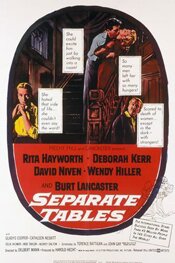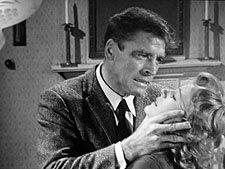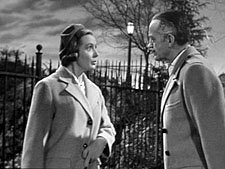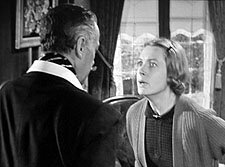 Directed by Delbert Mann
Directed by Delbert Mann
This feels like a very British film although, as director Delbert Mann points out in his commentary, Separate Tables (1958) is directed by an American (Delbert Mann), has stars like Burt Lancaster, Rita Hayworth and Rod Taylor, was shot entirely on a set – probably in Calfornia, though I don’t recall now.
Be that as it may, it feels very British because it also stars Deborah Kerr, David Niven, and Wendy Hiller, not to mention numerous other British actors in supporting roles. The set is also extremely well done as the Beauregard Hotel, a seaside hotel in Bournemouth, England.
Having a look online at the few scant reviews of this movie that are out there it’s fascinating to see their polarization. People either love this movie or really hate it. Personally, having seen the film three or four times now, I’d be with the former group.
It’s a bit discouraging seeing the comments by those who hate the film. The complaint is essentially that it’s boring and the reason for that is the characters aren’t interesting. They’re dull losers.
Losers may be a bit strong, but I do understand where that comment is coming from. Yet that’s exactly why I like this film. This is a story about lonely people. As one character mentions at one point, the people in the hotel have removed themselves from the world. They are isolates – it’s in their nature. (That last is the character’s view. I’m not sure I’d agree with that.)
 There are two essential storylines in the film (based on two one-act plays by screenwriter Terrence Rattigan, who also wrote the play, and John Gay). One has to do with the stormy relationship between Hayworth and Lancaster – he’s hidden himself at the hotel, one of their oldest permanent guests, from his previous life, which was as the husband of Hayworth’s character, Ann Shankland. (That role was originally going to be played by Vivien Leigh but apparently she dropped out when her then husband Laurence Olivier decided not to direct the movie.)
There are two essential storylines in the film (based on two one-act plays by screenwriter Terrence Rattigan, who also wrote the play, and John Gay). One has to do with the stormy relationship between Hayworth and Lancaster – he’s hidden himself at the hotel, one of their oldest permanent guests, from his previous life, which was as the husband of Hayworth’s character, Ann Shankland. (That role was originally going to be played by Vivien Leigh but apparently she dropped out when her then husband Laurence Olivier decided not to direct the movie.)
The other storyline, and the one that bookends the film, concerns David Niven’s character, Major Angus Pollock, and Deborah Kerr’s character, Sibyl.
 Niven is a blowhard of sorts, though not an obnoxious one, just a bit pathetic. As it turns out, almost everything he says is a lie about himself and his position in the world. He puffs himself up with tales of his days in the army.
Niven is a blowhard of sorts, though not an obnoxious one, just a bit pathetic. As it turns out, almost everything he says is a lie about himself and his position in the world. He puffs himself up with tales of his days in the army.
Sibyl is a meek, frightened girl dominated by her mother. She’s repressed in almost every way a person can be repressed. And she’s credulous. She believes everything the Major says.
Their crisis occurs when the Major’s lies are revealed in, for the time and place, a shocking way. Although he tries to cover it up, the hotel’s guests discover he’s been arrested and has pleaded guilty to charges of indecent behavior. In our current day terms, he’s revealed as a kind of sexual pervert, although his actions are incredibly tame by today’s standards. He’s simply a sad, pathetic man – which is how he is revealed.
There is a wonderful scene where Niven as the Major explains to Sibyl (Kerr) that in many ways they are two of a kind: both are afraid of life, relationships, sex. Sibyl is appalled at the idea but you can see how she recognizes the truth in what he says.
It’s this aspect of the film I find compelling. It’s a study of loneliness, and a kind of exploration of it.  Although the Major’s “indecency” is extremely tame for today, by 1958 standards I suppose you could call it shocking. This aspect is not really important, however. What’s important is how it illustrates how human need, not addressed, comes out in other ways, in this case the Major’s behavior which he says he doesn’t understand himself. But it’s clear that, to a large extent, it’s because, as he puts it, he’s “afraid of women.” He’s lonely, unable to interact in terms of the usual ways of people so, again as he puts it, he can only approach women “in the dark.”
Although the Major’s “indecency” is extremely tame for today, by 1958 standards I suppose you could call it shocking. This aspect is not really important, however. What’s important is how it illustrates how human need, not addressed, comes out in other ways, in this case the Major’s behavior which he says he doesn’t understand himself. But it’s clear that, to a large extent, it’s because, as he puts it, he’s “afraid of women.” He’s lonely, unable to interact in terms of the usual ways of people so, again as he puts it, he can only approach women “in the dark.”
He and Sibyl, however, have connected not in any sexual kind of way but in the sense they each recognize a kindred spirit. Both are afraid. Each finds a kind of solace in the other and a kind of freedom from their debilitating limitation.
However, this makes for a movie that is character study with lots of dialogue and no fight sequences, car chases or explosions. You have to find people interesting to find this movie interesting. But if you do, this is a wonderful film. In fact, I kind of like its quieter, gentler pace.
The title, Separate Tables, is also interesting in that it suggests, pretty clearly, that all of these people are separated, isolated. Yet, as we see (especially in the closing scene), the appearance of separation is, to some extent, just that – appearance. As one character (Lancaster’s, I think) mentions, they communicate across the distance between them, between the tables, because, though separated, they are close enough for that. As isolated as we may think we are, we’re never completely alone.
It may be an acquired taste, but if it’s to yours I think, like me, you’ll find Separate Tables an extremely rewarding movie.
Separate Tables on DVD:



Agree with you — I loved this movie from the first viewing, and I’ve watched it several times since. What was also poignant to me was that however flawed the Major was in what he did, he played an important part in Sybil’s life, in that she finally had the courage to release herself from her mother’s grasp. The kindred spirit they found in each other’s company reminded me of the two main characters in another movie, “The Enchanted Cottage.”
I like your analysis of the loneliness theme. Another film that focuses on lonely people is Welcome to L.A. (1976). I also like your statement about the Major: “Niven is a blowhard of sorts, though not an obnoxious one, just a bit pathetic.” I wrote a short post on Broken Tables called “What it Means to Be Judgmental.” If you would like to read it, here is the link: https://christopherjohnlindsay.wordpress.com/2015/06/27/separate-tables/